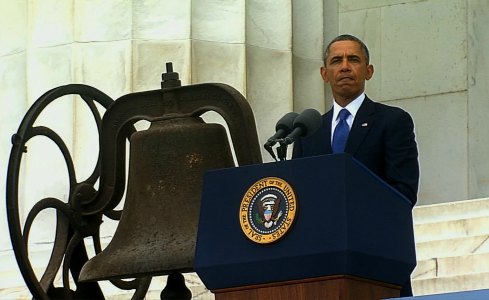
I was privileged to attend the March on Washington in 1963, and count it as one of the most profound experiences of my life. The sheer outpouring of thousands of people, particularly Black people, was a testament to our aspirations and determination to win jobs, justice and freedom. The March proved to be a decisive moment in the Black Freedom Struggle and for the nation. On August 24, I was privileged to attend the commemoration of the 50thAnniversary of the March on Washington (MOW). Indeed, this commemoration was marked by scores of substantive and celebrative programs, including the Institute of the Black World 21st Century’s release of an executive summary of its Black Paper – A Deposit Was Made But the Check Still Bounced.
Tens of thousands of people poured into D.C. for the massive Rally and March on the National Mall. It was especially exhilarating to see so many young people, large numbers of them wearing Justice for Trayvon Martin T-Shirts or hoisting placards with the same theme. Whenever thousands of people are motivated to gather to demand justice, it must be judged a success.
But the thousands who journeyed to D.C. came not only to demand justice; they were looking to the “leadership” to provide a blueprint/agenda, strategy and marching orders to translate their demands into victories. The agenda of issues presented by most of the speakers was closely tied to the grievances that motivated folks to attend the Rally/March: the recent Supreme Court decision that gutted the Voting Rights Act, voter suppression laws being passed in states such as North Carolina and Texas and the demand for justice, highlighted by the Trayvon Martin case. In the case of the latter, they demanded an end to the “Stand Your Ground” laws.
These issues are certainly pertinent and the call to address them very important. However, there were some critical omissions that may dilute the potential impact of the commemoration. Given the “State of Emergency” in urban inner-city neighborhoods across this country – America’s “dark ghettos” – President Obama’s jobs program is necessary, but woefully inadequate to repair the decades of damage done by government disinvestment, capital flight and deindustrialization. Therefore, it would have been a source of inspiration if Rev. Al Sharpton as the keynote speaker had boldly reissued the call for a “Domestic Marshall Plan” to rebuild America’s dark ghettos.
After the billions of dollars squandered in Viet Nam, Iraq and Afghanistan, the gauntlet should have been thrown down for America to make a huge deposit on the “promissory note” King referenced in his speech a half century ago. How can the U.S. justify “nation-building” in Iraq and Afghanistan and refuse to do “community-building” on behalf of her long-suffering sons and daughters of Africa in America? Moreover, picking up on the mission King was embarking on prior to being gunned down in Memphis, someone might have thought to restate the call for the enactment of an Economic Bill of Rights to ensure that every American is guaranteed a basic quality of life in terms of employment/income, housing, education and health care.
The final glaring omission was the absence of a call to utilize boycotts as a non-violent means to change the hearts and minds of obstructionists who refuse to respond to moral appeals to do the right thing. It is useful to recall that Dr. King rose to prominence because he successfully led the Montgomery Bus Boycott. Black passengers refused to ride buses, withdrew their patronage, exacted economic sanctions, until the segregationist city fathers relented. In his final speech in Memphis, Dr. King challenged Black people to use boycotts to “redistribute the pain” to pursue and achieve our righteous quest for social, economic and political justice.
In the face of Stevie Wonder’s courageous decision not to perform in Florida until the Stand Your Ground law is abolished, and calls by the Institute of the Black World 21st Century
and numerous organizations and individuals to boycott Florida, it was astonishing that not a single national civil rights leader endorsed the boycott Florida campaign. Clearly, the boycott is a people-based effort that can inflict the kind of economic pain on the tourist industry that can lead to repeal the state’s Stand Your Ground law. One wonders whether corporate contributions to our major civil rights organizations are restraining them from vigorously embracing and advocating a time-tested means of mobilizing our people to achieve victories.
The commemoration of the 50th anniversary of the March on Washington was a success, but it lacked a bold vision/mission to inspire Black people and the “beloved community” to move from a reactive to pro-active mode in the struggle to finish the unfinished civil rights/human rights agenda. And, one of the most potent non-violent weapons for achieving justice was left off the table – economic sanctions. However, rather than simply complain, it remains for those who make the critique to fill in the blanks by articulating a broader vision and educating, mobilizing/organizing Black people to utilize Black dollars as a weapon in the Black freedom struggle.
Boycott Florida!
Ron Daniels is president of the Institute of the Black World 21st Century and Distinguished Lecturer at York College City University of New York. To send a message, arrange media interviews or speaking engagements, he can be reached via email at info@ibw21.org.
